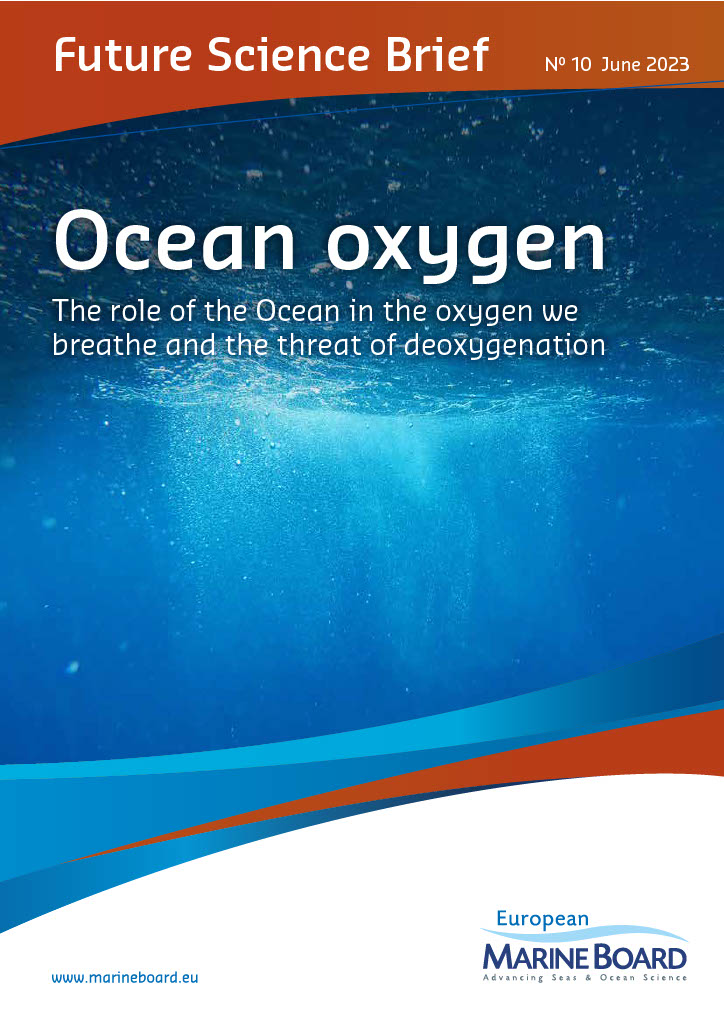Outputs

Future Science Brief 10 'Ocean oxygen: the role of the Ocean in the oxygen we breathe and the threat of deoxygenation' (June 2023)
News article on Future Science Brief publication (June 2023)
Webinars
The document was presented during a dedicated webinar: re-watch it here
Background
Scientists, science communicators and policy makers often say “every second breath you take comes from the Ocean” or similar to highlight the importance of the Ocean for humans. Despite the widespread use of this phrase, its scientific foundations are unclear and there is growing debate among scientists about the correctness of the sentence. There is therefore a need to clarify the science underpinning the actual connection between the oxygen reservoir in the atmosphere and primary production in the Ocean, including differences in timelines for marine- and terrestrially-produced oxygen.
Increasing our understanding on Ocean Oxygen is also critical due to the looming threat of Ocean deoxygenation. The loss of dissolved oxygen from the Ocean to the atmosphere, also known as Ocean deoxygenation, is one of the most worrying changes occurring in marine ecosystems and yet it is heavily under-communicated. Global warming leads to oxygen loss, both directly and indirectly. Another major source of Ocean oxygen loss is eutrophication as a result of nutrient run-off. The global Ocean oxygen content has decreased on average by ~2 % since the middle of the 20th century. Ocean model simulations predict a decline in dissolved oxygen in the Ocean of 1 to 7% by the year 2100, and comparisons of models and observations suggests that models underestimate the true rate of ocean oxygen. The effects of Ocean deoxygenation are further amplified by Ocean warming and Ocean acidification, as these three major stressors commonly co-occur because they share the common cause of CO2 emissions.
Consequences of Ocean deoxygenation include decreased biodiversity, shifts in species distributions, displacement or reduction in fisheries resources, and changes in biogeochemical cycling. These changes are taking place on such a large scale that experts foresee that they will have implications for the global biochemistry and climate, with a less productive Ocean and a lower capacity of both land and Ocean to serve as carbon sinks. The continued spreading of deoxygenated areas in the Ocean is therefore of great concern, with potentially great impacts on biodiversity and human societies.
This working group provides input to the UN Decade of Ocean Science for Sustainable Development (2021-2030) societal outcome that aims for a healthy and resilient ocean, as well as to the objectives and enablers of the EU Mission: Restore our Ocean and Waters.
Objectives
The EMB Working Group on Ocean Oxygen has two main objectives:
- explaining the science behind the statement ‘every second breath comes from the Ocean’ to contribute to the correct use of this sentence, without undermining the validity of communications that state that the Ocean is a fundamental source of oxygen on Earth;
- communicating the problem of Ocean deoxygenation
Specific topics that could be addressed in relation to the two main objectives could include but are not limited to:
- Providing an overview of the current global oxygen cycle;
- Providing an account of the history of Earth’s oxygenation;
- Raising awareness of the problem of Ocean deoxygenation: explaining drivers, consequences and future projections, as well as further science and management needs
- Highlighting correct examples of sentences related to the “every second breath” statement that can be used in science communication;
- Raising awareness of the interconnectedness of all life (and across marine-terrestrial boundaries) through biochemical cycles. For instance, by:
- providing examples of how Ocean deoxygenation will affect terrestrial ecosystems and humans
- providing specific examples of interconnectedness (e.g. healthy whale populations indirectly promote oxygen production)
Terms of Reference
The Terms of Reference describing the objectives and operation of the Working Group can be downloaded here.
Meetings
- 21-22 June 2022 (kick-off, in-person & online)
- 26 August 2022 (online)
- 18-19 October 2022 (in-person & online)
Working Group Members
Chair: Marilaure Grégoire, University of Liège, Belgium
Co-Chair: Andreas Oschlies, GEOMAR, Germany
Donald Canfield, University of Southern Denmark
Carmen Castro, Instituto de Investigaciones Marinas (IIM - CSIC), Spain
Irena Ciglenečki-Jušić, Ruđer Bošković Institute (IRB), Croatia
Peter Croot, NUI Galway, Ireland
Karine Salin, Ifremer, UMR LEMAR, France
Birgit Schneider, University of Kiel, Germany
Pablo Serret, Centro Investigación Mariña, University of Vigo, Spain
Caroline Slomp, Radboud University & Utrecht University, Netherlands
Tommaso Tesi, Institute of Polar Sciences, National Research Council, Italy
Mustafa Yucel, Institute of Marine Sciences, Middle East Technical University, Turkey
EMB Communication Panel support: Jan Seys - VLIZ, Belgium
Contact at European Marine Board Secretariat: Ana Rodriguez Email